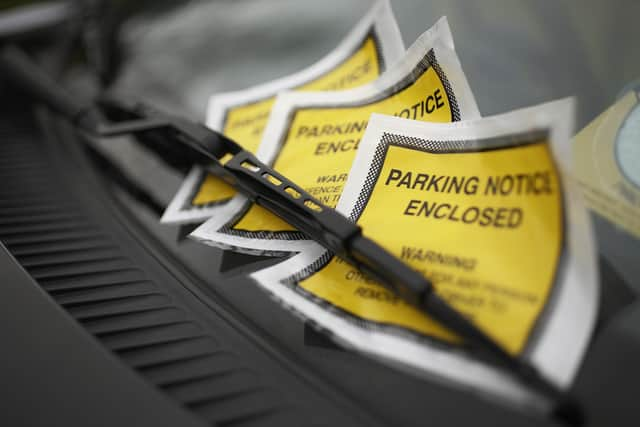Parking rules UK: Why code of conduct’s fine limits and easier appeals are under threat
and live on Freeview channel 276
A plan to slash maximum parking fines and crack down on rogue private parking firms is facing delays after “bully” operators lodged legal challenges.
The Private Parking Code of Practice, which would set caps on fines in England, Scotland and Wales and clamp down on debt collectors, has been temporarily withdrawn by the Government after parking firms objected to its proposals.
Advertisement
Hide AdAdvertisement
Hide AdPrivate parking operators launched legal challenges to plans to cut the maximum cost of a parking charge from £100 to £50 and to stop firms from charging additional “debt recovery” fees on top of the parking charge.
As a result, the code has been temporarily withdrawn, with motoring groups warning the action could delay moves to banish “cowboy” operators and create a fairer system for drivers.


As well as a cut in the maximum charge and a ban on additional fees, the code proposed a single independent appeals process for drivers who dispute their ticket and a standard 10-minute grace period for drivers who overstay.
It would also block operators who break the rules from accessing the DLVA data they use to pursue motorists.
Advertisement
Hide AdAdvertisement
Hide AdThe Government says these other changes will be unaffected by the current legal challenges.
When plans for the code were announced, levelling up minister Neil O’Brien said it would address the “misleading and confusing signage, opaque appeals services, aggressive debt collection and unreasonable fees designed to extort money from motorists”.
The code was due to come into practice in late 2023 and be fully implemented by 2024 but it is unclear how its withdrawal will affect that timetable.
The AA’s president Edmund King said: “For too long, private parking enforcement has been allowed to degenerate into a Wild West where cowboy operators have been able to ride into a town and set their own rules and punishments.
Advertisement
Hide AdAdvertisement
Hide Ad“The judicial reviews are a setback but the Government must hold firm and restore order among those who like to bully motorists.”
The RAC’s head of roads policy Nicholas Lyes said the operators’ actions showed why the code was necessary.
He said: “The new private parking code of practice was designed specifically to make things fairer for drivers and end some of the worst practices in the sector. It’s deeply disappointing that the code has been temporarily withdrawn which now almost certainly means yet more delays in it being introduced.
“The fact that parking companies take issue with the capping of charge notices and debt recovery fees shows precisely why both the code and the cap are needed.
Advertisement
Hide AdAdvertisement
Hide Ad“For too long, some companies have been allowed to prey mercilessly on drivers who might make an honest mistake and then have to face both over-zealous enforcement and threatening debt recovery letters.
“The Government must stand up to these companies and get the code over the line so we finally have fair and transparent enforcement in the private parking sector.”
A spokesperson for the Department for Levelling Up, Housing and Communities dept said the code would be introduced once a second consultation had taken place.
They said: “We have received a legal challenge from parking operators on two elements of the code and we now have to go back and reconsult with the industry.
Advertisement
Hide AdAdvertisement
Hide Ad“The other elements of the code remain intact and we are very much hopeful that the two we are reconsulting on will also remain.”
Asked what impact the new consultation could have on the code’s introduction, they said the department would keep as close to the 2023 timetable as possible.
